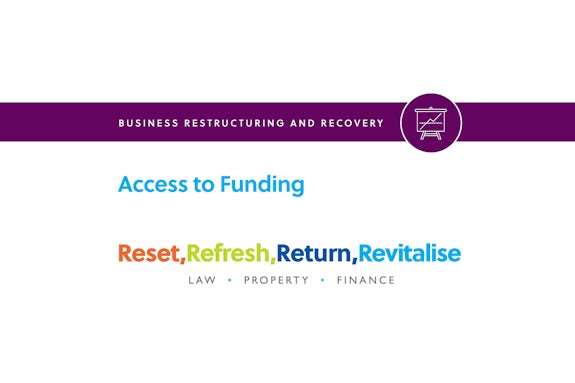
By David Winnie
May 12, 2025

Restructuring Partner, Craig Darling.
As we all know, in response to the Covid pandemic, the Government introduced three loan schemes for businesses: the Bounce Back Loan Scheme, the Coronavirus Business Interruption Loan Scheme (split into two for smaller and larger companies) and the Covid Corporate Financing Facility (from the Bank of England). The deadline for applications was changed on October 31 so you now have until January 31, not November 4 as it was originally, to apply.
The time period for paying back the loan was also extended under the new “pay as you grow” scheme. Businesses now have ten years instead of six to repay a Bounce Back Loan. Businesses can also move to interest-only payments or suspend payments, for up to six months, if they are “in real trouble”.
Financial services firms have, therefore, played (and it is anticipated shall continue to play) a critical role since the UK went into lockdown, giving unprecedented support to businesses and the wider economy. Recent Government numbers indicate that banks have supported £62bn of lending from Government schemes. According to the EY ITEM Club, it is estimated that total bank lending to businesses by the end of 2020 shall be around £493bn, significantly increased from 2019. UK borrowers’ 2020 net borrowing is expected to be around five times higher than the amount net borrowed in 2019, with many borrowers predicted to only start repaying this debt and reducing their borrowing from 2022. It is anticipated though that UK banks will continue to lend next year to support UK businesses and growth.
The general consensus may be that post-Covid the economy will bounce back relatively quickly, but that is not a certainty. There is also the shadow of post-Brexit looming over businesses and to date there is still no clarity or certainty on trade deals and any post-Brexit arrangements. Things will change for every business. All will be (or should be) looking at their business operating model and checking whether and how it will change – and some will have to make significant changes. Many businesses are already planning to restructure to ensure their cost base is consistent with their revenues (however they may be projected in such unique and challenging times).
However, the banking sector is facing a multitude of challenges, with EY ITEM Club reporting that total business loan losses are forecast to rise from 0.3% in 2019 to 0.4% and 0.5% this year and the next, as businesses struggle to meet their loan repayments. With a second Covid wave causing further lockdowns and tighter restrictions these challenges for banks are only likely to increase. In addition, for businesses, while the extension of the furlough scheme to 31 March 2021 is a boost, once that support ceases there shall undoubtedly be businesses that can’t survive in their current form or circumstances and shall inevitably require restructuring in one form or another.
Accordingly, whilst UK banks may continue lending in 2020, a combination of Government schemes being wound down or ending, and lenders potentially finding themselves squeezed and looking at higher write off levels and losses with struggling or closing borrowers, access to business lending shall likely become increasingly difficult. In that light, it is imperative that firms take action and plan now. They need to consider closely their business, its strategic plans and objectives and its financial requirements. They need to focus on the core aspects of their businesses. And they need to take appropriate financial and legal advice on restructuring their businesses and be fully armed to approach their lenders with the best possible business case for lenders to support them to allow their businesses to survive (and hopefully thrive) in 2021.
If you would like further information on the topic discussed in this article, please contact Craig Darling by email: cdarling@gilsongray.co.uk or by phone: 0141 530 2044 / 07841 920 467 . You can also view Craig’s profile by clicking here.
The information and opinions contained in this blog are for information only. They are not intended to constitute advice and should not be relied upon or considered as a replacement for advice. Before acting on any of the information contained in this blog, please seek specific advice from Gilson Gray.

Craig has more than 20 years’ experience in all aspects of corporate, banking, restructuring and insolvency law